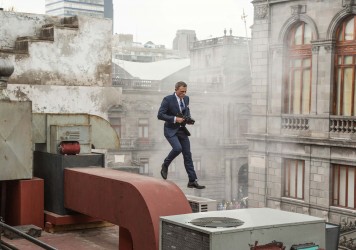Sam Mendes recruits Olivia Colman and Michael Ward for this mawkish tale of seafront woes and the healing power of movies.
There’s no nice way of putting it, but for this writer, to see the words “Directed by Sam Mendes” in the vicinity of a movie title is about as appealing as a platter of expired offal. As one of Britain’s leading directorial lights and a perpetual securer of critical and commercial plaudits, I have felt it a duty to keep my hand in with Mendes’ perpetually- middlebrow output as a way to broaden my horizons and keep tabs on the ebbs and flows of The Current Cinema.
It was with customary trepidation, then, that I hiked along to take in Empire of Light, a modern period drama also written by Mendes which takes in the domestic and emotional foibles of the staff at a sea-front picture palace on England’s south coast during the early 1980s. The crushing weight of potential disappointment was allied somewhat by the fact that the film stars Olivia Colman, who has rightly risen up to be recognised as one of the world’s greatest screen actors. And she is miraculous and heartbreaking here. Committed and thoughtful too. It’s the gravity of her presence that sells a story that would’ve fallen to pieces without the necessary heft she brings to the production.
She plays Hilary, a quietly officious cinema duty manager who refuses to watch the films, and is being used for sex by Colin Firth’s blustery boss. She falls into a surprising but authentically-drawn relationship with Michael Ward’s school leaver Stephen, who sees Hilary as a portal away from the scads of racial abuse he receives from both patrons in the cinema and the marauding skinheads on the streets.
Mendes and his cinematographer Roger Deakins capture the landscape in crisp, blank-ish wide shots, emphasising the essential loneliness of the protagonists as well as the cavernous empty space that comes from being inside a cinema. The film takes a mid-point turn and suddenly shifts its focus onto something more interesting. We discover a bit more of Hilary’s tragic background, and the film suddenly drills down to something moving and honest about the superficial nature of friendship and how our ability to suppress past demons is not always as successful as merely hiding them from others.
As a whole, the film doesn’t really work, as Mendes is far more successful in dealing with psychological issues than he is with political ones. Structurally, the film is a mess, and thematically its maker is unable to see the wood for the trees. It’s eventual and half-hearted ode to The Power of Cinema™ feels tacked on and insincere, another disparate element of a film that offers up a whole, jumbled collection of them. Yet this is worth seeing for Colman’s staggering turn, which unfortunately leaves her co-stars (and director) in the dust.
Published 9 Jan 2023
Another cursed offering from Sam Mendes! Agghhh!
Patchy, but contains a few kernels of truth, and Colman is sublime.
Throws more into the pot that it knows how to deal with, but some good stretches.

Sam Mendes’ gripping World War One drama is light on plot but displays plenty of technical panache.

How come there are no people in the world of this new James Bond movie?